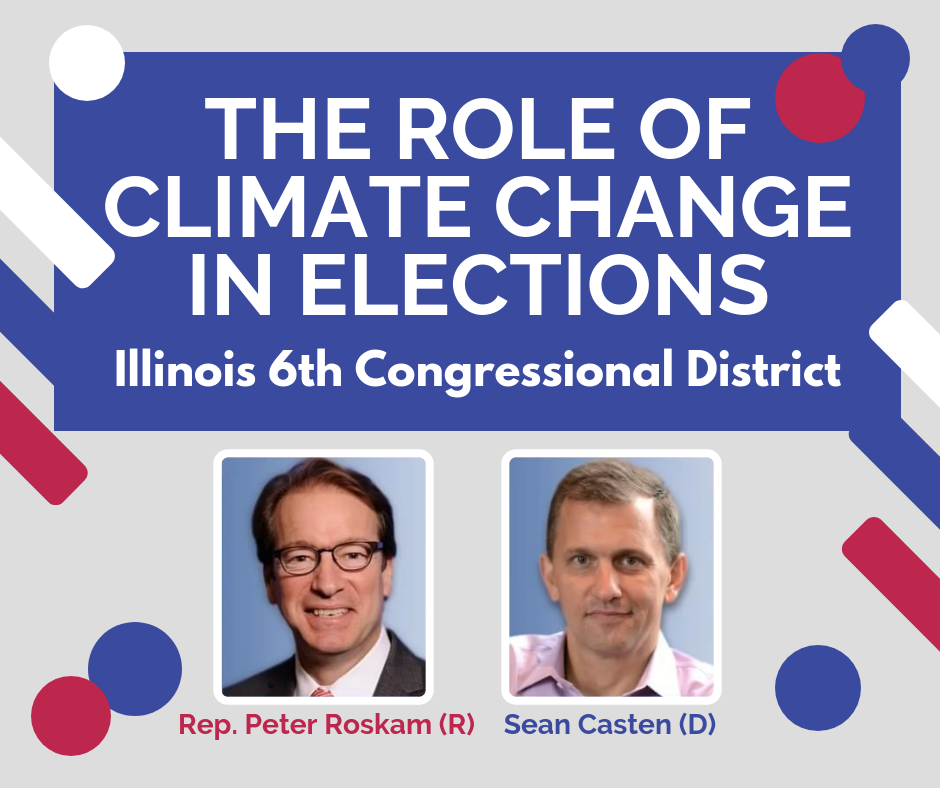Blog · October 18, 2018
The Role of Climate Change Policy in Illinois Congressional District 6
Our recently updated Yale Climate Opinion Maps allow us to analyze gaps between public opinion and political will at sub-national scales, allowing an exploration of the role climate change and energy could play in the 2018 election. This analysis focuses on competitive Congressional races in which climate and energy are part of the platform of one or more candidates, or where candidates are not talking about these issues, despite strong views by their constituents.
The very competitive race in the Illinois 6th Congressional District is an example. In this district, 70% of citizens think that climate change is happening, while only 13% do not.[1] Incumbent Rep. Peter Roskam (R), who has been in office since 2007, does not mention climate change or energy issues on his campaign website, and has faced protests from his constituents over his record on climate. Roskam, despite claiming in 2006 that climate change was “junk science,” recently joined the bipartisan Climate Solutions Caucus, saying: “It is incumbent upon each and every one of us to understand the impacts and challenges that come from a changing climate.” In contrast, his challenger Sean Casten (D) is a clean energy entrepreneur whose platform calls for aggressive action on climate change and deployment of clean energy as an engine for economic growth. He has criticized Roskam’s dismissal of climate change, and has said that to disregard climate change is “to argue that you disagree with the laws of thermodynamics – it is uninformed, and massively irresponsible.”[2] Let’s examine how the constituents in Illinois’ 6th District compare to the views of these two candidates.
In Illinois’s 6th District, 57% think that global warming will harm people in the U.S., and 32% do not. 59% of citizens are worried about global warming, and 40% are not. Despite this, Roskam has repeatedly opposed bills allowing federal agencies and the military to research and prepare for the impacts of climate change.[3], [4], [5]
In contrast, Casten has made climate change policies a primary objective in his campaign. Referring to climate change as “the challenge of our generation,” Casten has supported policies to combat climate change (like the Clean Power Plan), and has criticized the Trump administration for pulling the U.S. out of of the Paris Agreement. He also believes that climate change has geopolitical impacts that will affect U.S. citizens.
Policy Support
For Roskam’s decade in the House, he received a League of Conservation Voters score of 7 out of 100 and a score of 3 out of 100 for the year 2017. These scores reflect Roskam’s voting record on environmental and climate change policies.
Since joining the Climate Solutions Caucus, Roskam voted to let the Environmental Protection Agency (EPA) consider the social cost of carbon and implement methane regulations, but voted against pricing carbon, which 67% of his constituents support. Failing to align with the 78% of his constituents that support regulating CO2 as a pollutant, Roskam voted against regulating carbon dioxide.
In another vote against a potential carbon reduction policy, Roskam voted yes on a bill titled, “Expressing the sense of Congress that a carbon tax would be detrimental to the United States economy.” Yet 67% of citizens in his district support a carbon tax on the fossil fuel industry.
In April 2018, the Illinois Power Agency, which is responsible for procuring energy for the home state of these two candidates, clarified the state’s Renewable Portfolio Standard which now requires 25% renewables by 2025, as part of the 2016 Illinois Future Energy Jobs Act. Casten has hailed the policy as much needed for the state, and argued for a national “Fossil Energy Reduction Standard” that mandates a rising percentage of renewable energy. Roskam voted against a renewable electricity standard in Congress, despite 64% of his constituents supporting such a policy.
Roskam has also declined to support bills encouraging renewable energy, though 87% of his district supports funding research into renewable energy sources. Roskam abstained from voting for the 2018 “Make America Secure” Appropriations Act, which included provisions for funding federal renewable energy, supporting instead an “all-of-the-above” approach towards energy use.
Furthermore, Roskam is against legislation that would provide tax refunds for people buying energy-efficient products. In 2008, Roskam voted “no” on the Renewable Energy and Job Creation Tax Act, which would have provided tax credits to those purchasing renewable electricity. In contrast, 84% of of his constituents support tax rebates for energy efficiency measures.
Casten, on the other hand, has voiced support for policy initiatives similar to those which Roskam has repeatedly voted against.[6] He is pro-renewable energy, asserting that it will combat the negative effects of global warming and stimulate the U.S. economy. Like the majority of 6th District voters, he also supports regulating and taxing carbon, arguing that doing so would be profitable for the U.S.’s economy. Casten has stated that if elected, he would support incentives for energy efficient vehicles and renewable energy.[7], [8]
This year’s election could be a critical inflection point for both the politics and policy of climate change in America. Our research indicates that there is often a gap between what Americans think about climate change, what climate and energy policies they support, and what their elected Representatives in Congress are doing. Illinois’ 6th District may be a race to watch over the next month, and the midterm results may indicate that voters prioritize policies that take action on climate change.
[1] All data on public opinion is from the Yale Climate Opinion Maps.
[2] https://chicago.suntimes.com/politics/6th-congressional-district-democratic-candidate-sean-casten-2018-illinois-primary/
[3] https://www.congress.gov/amendment/115th-congress/house-amendment/179
[4] https://www.congress.gov/bill/114th-congress/senate-bill/2943/text
[5] https://www.congress.gov/bill/113th-congress/house-bill/4923
[6] https://castenforcongress.com/blog/2018/05/18/roskam-climate-change-release/
[7] https://grist.org/article/carbon-policy-details-part-5/
[8] https://castenforcongress.com/blog/2018/05/18/roskam-climate-change-release/






